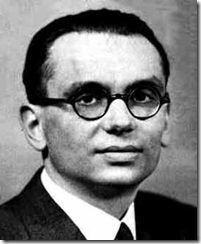4:24 PM (2 hours ago)Philosophy Word of the Day – Gödel’s Incompleteness Theoremfrom Cloud of Witnesses by fleance7By the early part of the twentieth century, the work of mathematical logicians such as Gottlob Frege, Bertrand Russell, and Alfred North Whitehead had honed the axiomatic method into an almost machine-like technique of producing mathematical theorems from carefully stated first principles (axioms) by means of clear logical rules of inference. In 1931, however, Kurt Gödel (1906–1978), an Austrian logician, uncovered a surprising limitation inherent in any axiomatic system intended to produce theorems expressing the familiar mathematical properties of integer arithmetic.

Gödel developed a method, whose reach was slightly extended by J. Barkley Rosser in 1936, that shows how, given any such (consistent) system of axioms, one can produce a true proposition about integers that the axiomatic system itself cannot produce as a theorem. Gödel’s incompleteness result follows: Unless the axioms of arithmetic are inconsistent (self-contradictory), not all arithmetical truths can be deduced in such machine-like fashion from any fixed set of axioms. This result, that here consistency implies “incompleteness,” has striking implications not only for mathematical logic, but also for machine-learning (artificial intelligence) and epistemology, although its precise significance is still debated. (continue article)
— W. M. Priestly, Encyclopedia of Science and Religion

No comments:
Post a Comment